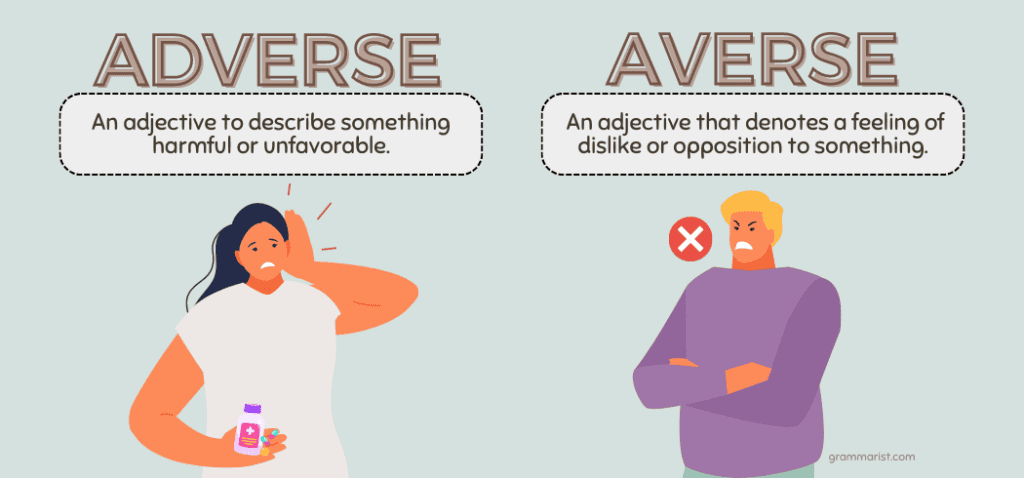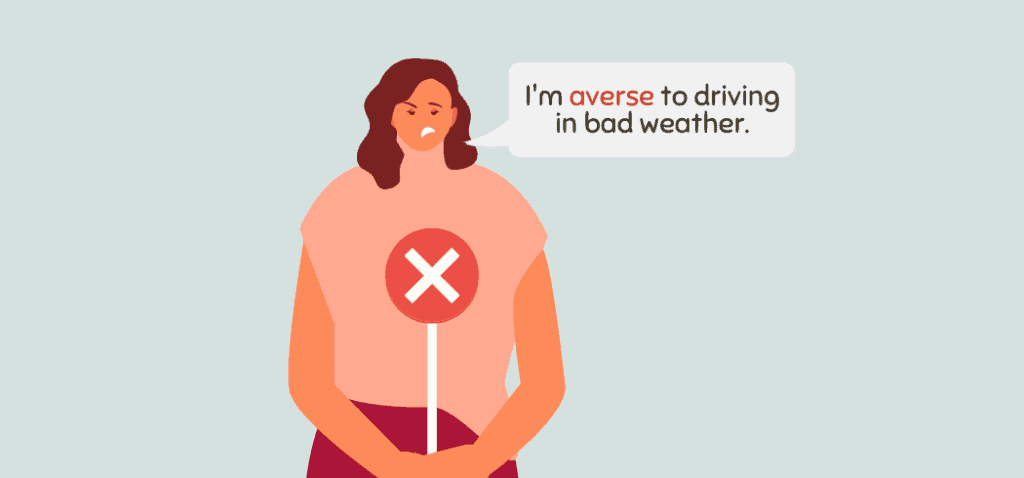Is there a pair of words that you always have to Google to get the meanings straight? I bet it’s adverse and averse, isn’t it? I’ll admit sometimes I have to think for a second before I use either of these terms because they’re so darn similar! But I do have some tips to remember the difference and how to use them, so read on!
Adverse vs. Averse: The Difference Between the Two

Understanding the difference between these two terms means getting their definitions nailed down in a way you won’t forget.
We use adverse as an adjective to describe something harmful or unfavorable. The word averse is so close to adverse because it’s also an adjective. However, it denotes a feeling of dislike or opposition to something.
- Adverse: Some medications have adverse side effects.
- Averse: I’m averse to taking certain medications because of the potential side effects and adverse reactions.
Adversion vs. Aversion
So, let’s get something clear first. Adversion isn’t technically a word recognized in the English language, even though it’s used all the time. You’d instead utilize the word “aversion” and tweak the arrangement of the statement.
So, instead of saying, “The medication has adversive side effects” or “The medication’s side effects are an adversion,” you should say, “I have an aversion to taking that medication because of the adverse side effects.”
Make sense? I know it’s confusing, but the easiest way to remember is to think of “adverse” as the only form of that word, except “adversity.”
What Is the Difference Between Adversity and Aversity?
“Adversity” is classed as a noun in English and is used to refer to a difficult or negative situation that usually involves some kind of hardship or even misfortune.
But “aversity” isn’t a recognized term in the English language. Instead, the noun form of “averse” is “aversion,” which we covered above and signifies a strong dislike of something.
Adverb Forms
The adverb forms of these two terms are aversely and adversely.
What Are the Synonyms of Adverse?
Synonyms are a great way to understand the meanings of certain words because you might be more familiar with their synonyms.
- Unfavorable
- Harmful
- Negative
- Detrimental
- Hostile
What Are the Synonyms of Averse?
- Reluctant
- Opposed
- Resistant
- Antipathetic
- Loath
Using Adverse in a Sentence Example
- The adverse weather conditions forced the cancellation of my outdoor book signing.
- My husband experienced adverse side effects from the medication, so he asked his doctor for an alternative.
- The adverse conditions of the old buildings and campus will likely get it condemned.
- The clothing company faced adverse consequences due to its unethical business practices and ignorance of child labor laws.
- The archeology team encountered adverse circumstances during their expedition into the tomb they uncovered.
Seeing Averse Examples in a Sentence

- My dad lost a lot of money years ago, so now he’s averse to taking risks in his investments.
- I’m averse to driving in bad weather.
- My sister was averse to the idea of moving to another country at first but now loves living in Italy.
- Lots of people are averse to major changes because they prefer the comfort of what they know.
- My grandfather is averse to the use of technology because he grew up in a time before electricity.
Adverse and Averse: They’re Not the Same
This is one of the harder pairs of words to get straight because they’re just so alike, not just in spelling but also in their distinct meanings. Just remember that “adverse” describes the item, and “averse” describes the behavior or reluctance.

Comments are closed.